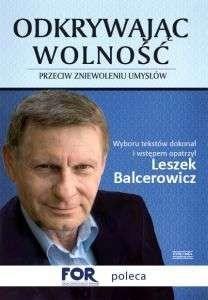
Discovering Freedom book cover (image: www.for.org.pl)
While spending this holiday season in my native Poland, I added a new book to my Christmas gift wish list: Odkrywając Wolność – Discovering Freedom - by Leszek Balcerowicz. After 1989 Balcerowicz shaped Poland’s economic transformation from communism to market economy, facing difficult reforms along the way in the context of building young and fragile democratic institutions. The book is not an autobiography detailing his personal account of the transition. Nor is it a technical textbook for fellow economists or political scientists. Instead, the book is meant for every citizen as a foundation of knowledge on political and economic freedom.
As Poland’s Finance Minister in the first post-communist government during the crucial period from 1989 to 1991, then again from 1997 to 2000, and as the Chairman of the National Bank of Poland 2001-2007, Balcerowicz has been one of the most influential policymakers in the country. In recent years, he successfully tried another role – as the head of a new think tank, Civil Development Forum, or FOR (Forum Obywatelskiego Rozwoju). FOR’s stated mission is to protect liberty and promote truth and common sense in public discourse. What the organization believes makes it distinct is effectiveness. In FOR’s own words, “We do not exist to simply publish texts and hold conferences, though we use these tools. We aim to amend existing laws, influence decision-makers considering new laws and to educate the general public, because well informed citizens are the best bulwark against despotism.”
In this spirit of making the principles of liberty easily understandable and accessible to the general public, Discovering Freedom is a extensive compilation (over 1,000 pages!) of writings by the greatest free thinkers, from Adam Smith and Milton Friedman to Karl Popper and Mario Vargas Llosa. Balcerowicz made the selection and wrote the introduction. Many of these texts had not been previously widely known in Poland and the book’s objective is to popularize them because, as Balcerowicz put it, societies must constantly strive for freedom.
In a recent interview he noted that while democracy is an indispensable element of liberty, simply holding elections does not sufficiently guarantee its preservation. In fact, democracies often produce laws and regulations that undermine political and economic freedoms because that may be in the interest of some small but influential interest group.
Commenting on the case of Poland he said, “What happened in 1989 was a gift of history but the transformation is not complete. Various pressure groups exists, which is normal in a democracy. But if groups that only formulate populist demands toward the state dominate without a counter-balance, that will end in stagnation or crisis. If we want to avoid such scenarios, we must build civil society groups that expose empty promises and can make the case against them to shape public opinion. Otherwise democracy will result in bad governance, even if still better than in a non-democratic system. There is no good substitute for the engagement from civil society. That is what I’m devoting my time to after the end of my long public service.”
Balcerowicz also emphasizes the role of economic freedom in ensuring liberty. “Private property rights are among the fundamentals. It is a historic paradox that fundamentally important economic freedom that enables social prosperity has become the object of viscous attacks. Marxism was the most serious such attack. (…) It resulted in millions of people losing their lives and billions losing time that could have been spent on rising from poverty.”
That message of indivisible freedom and the role of civil society in fostering it is at the core of CIPE’s work around the world. It is especially resonant today in the Middle East or Burma where new political and economic transitions are underway. In these countries the challenges that Poland had to address two decades ago, and in some respects still continues to struggle with, are of utmost importance at this crucial time. Will they capitalize on a unique opportunity to translate their gift of history into free and prosperous societies? As we exchange holiday wishes, let’s sincerely wish them success.
Anna Nadgrodkiewicz is Global Program Officer at CIPE.

